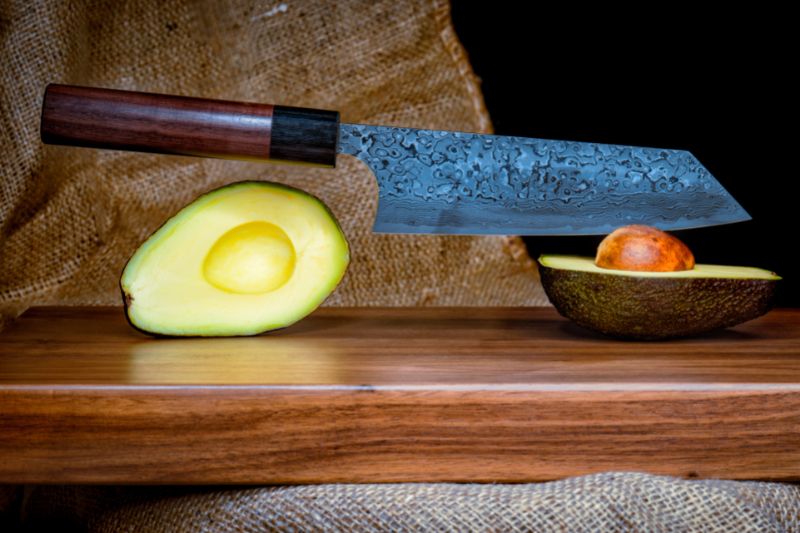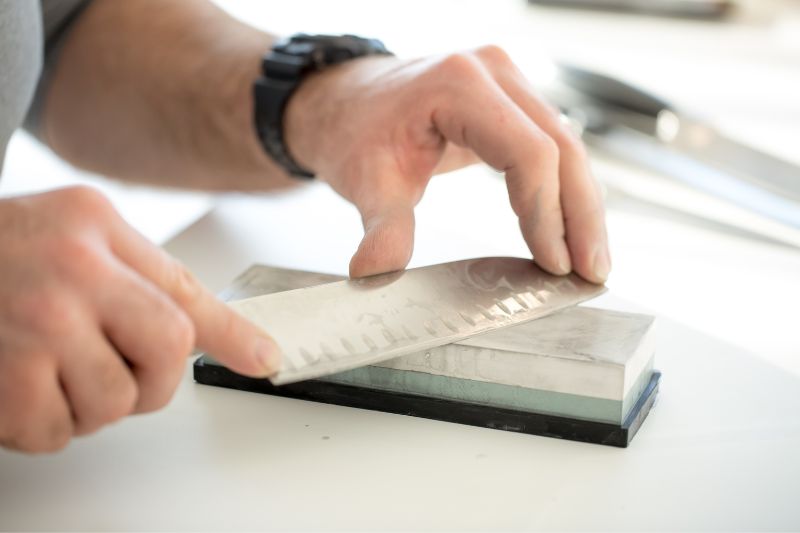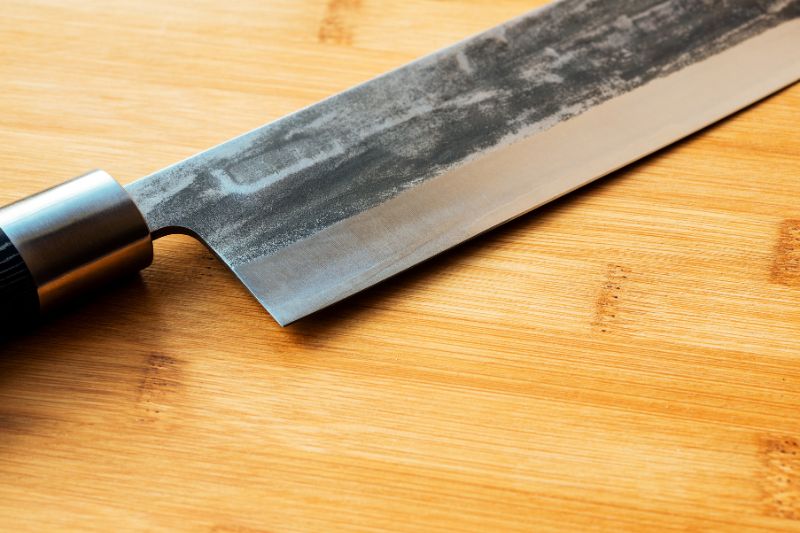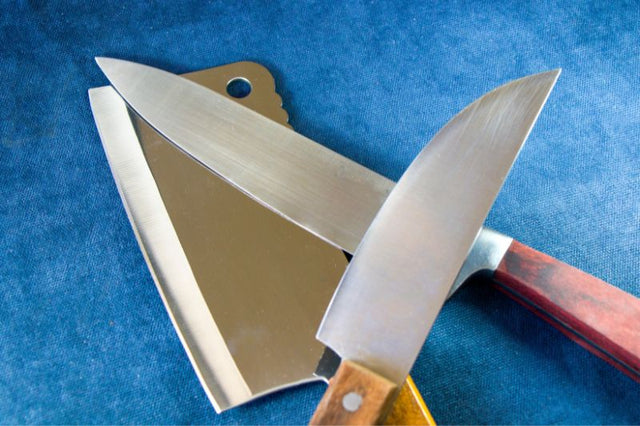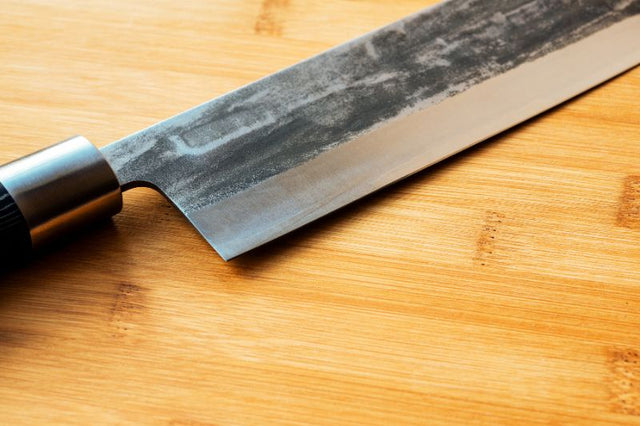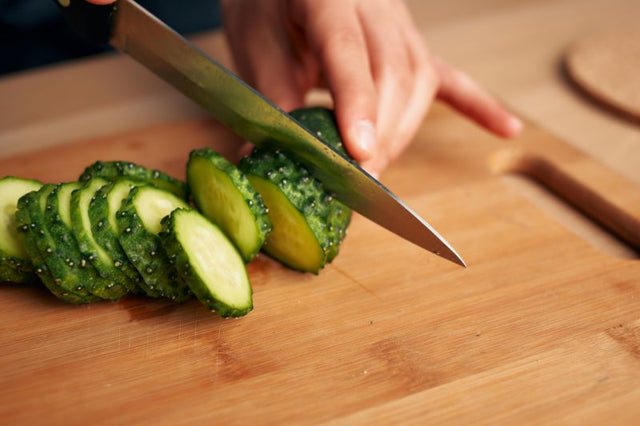Japanese knives are highly regarded for their precision, sharpness, and versatility in the kitchen. While they may be more delicate than some Western-style knives, this delicacy is a crucial advantage in certain kitchen tasks.
One reason for this is that Japanese knives are typically made from harder, more brittle steel than Western knives, which allows for a sharper edge and more precise cuts. This harder steel also allows for a thinner blade, making it easier to slice through delicate ingredients like fish or herbs without damaging them.
Another advantage of Japanese knives is their design. They often feature a thinner, more acute blade angle than Western knives, which allows for more precise cuts and greater control over the blade. A thin knife can be handy when filleting fish, slicing vegetables thinly, or performing other tasks requiring high precision.
Of course, like any knife, Japanese knives require care and attention to maintain their sharpness and durability. They should be stored properly, sharpened regularly, and used carefully to avoid chipping or breaking the blade. However, with proper care, a Japanese knife can be a valuable tool in any kitchen, allowing for greater precision and control in various tasks.
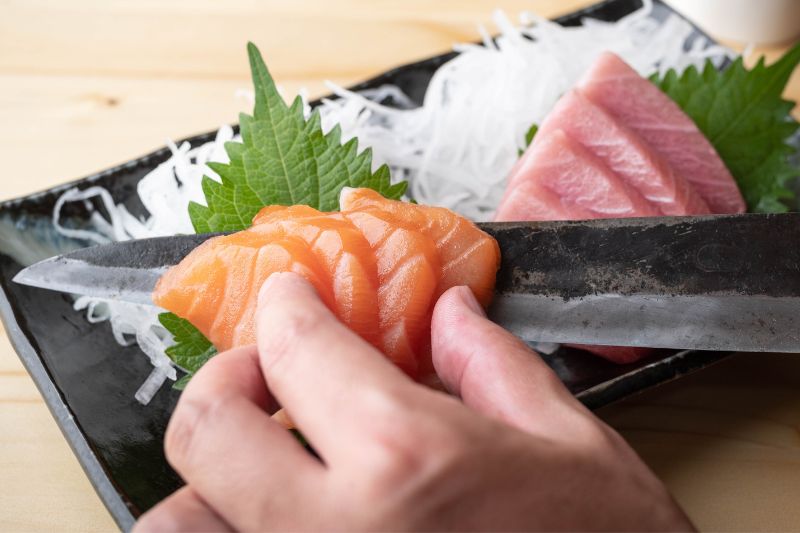
Do Japanese knives require more maintenance?
Japanese knives are typically made with harder steel than Western-style ones, making them more brittle and prone to chipping and breaking if not maintained properly. As a result, Japanese knives require more maintenance than other types of knives to keep them in good condition.
Regular maintenance of Japanese knives involves proper cleaning, sharpening, and storage. Always hand-wash Japanese knives with a mild detergent and dry them immediately. They should be sharpened regularly to maintain their sharp edge, using a sharpening stone or taking them to a professional sharpener. Additionally, it is important to store Japanese knives properly in a knife block, magnetic holder, or sheath to protect the blade and prevent damage.
With proper maintenance, Japanese knives can last for many years and offer excellent performance in the kitchen. However, if you take care of them properly, they can avoid becoming damaged and require more frequent maintenance or even replacement. So, while Japanese knives require a bit more maintenance, the extra effort is well worth it for their exceptional performance.
Japanese knives are often highly regarded for their sharpness and precision, but they can be more delicate than other types of knives. Here are some tips for making your Japanese knives last longer:
1. Hand wash and dry immediately
Japanese knives should always be hand-washed with a mild detergent and dried immediately. Avoid using the dishwasher or leaving the knives to soak in water, as this can damage the blade and handle.
2. Avoid cutting on hard surfaces
Japanese knives are typically made with harder steel than other knives, making them more brittle. Avoid cutting on hard surfaces like ceramic plates or glass cutting boards, as this can cause the blade to chip or crack. Instead, use wooden or plastic cutting boards.
3. Use the proper cutting motion
Japanese knives are designed for a specific cutting motion, with a push-pull technique that maintains the blade's edge. Avoid chopping or twisting the blade, which can cause it to dull or even break.
4. Sharpen regularly
Japanese knives should be sharpened regularly to maintain their edge. You can sharpen them yourself with a sharpening stone or take them to a professional for sharpening. Be sure to use the correct angle when sharpening the blade, which can vary depending on the type of knife.
5. Store properly
When not in use, Japanese knives should be stored in a knife block, magnetic holder, or sheath to protect the blade and prevent damage. Avoid storing them loose in a drawer, where they can become damaged or dull.
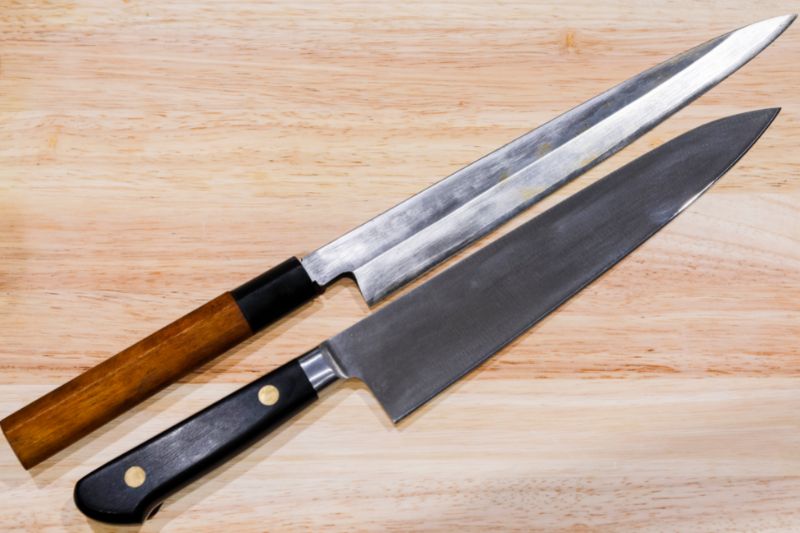 How do I keep Japanese knives from rusting and chipping?
How do I keep Japanese knives from rusting and chipping?
Japanese knives are often made of high-carbon or Damascus steel, making them susceptible to rusting and chipping if not adequately cared for. To prevent rusting and chipping, here are some tips:
1. Hand-wash and dry immediately
Japanese knives should always be hand-washed with a mild detergent and dried immediately. Avoid using the dishwasher or leaving the knives to soak in water, as this can cause rust and damage to the blade.
2. Use a honing rod
Use a honing rod to maintain the edge of the blade between sharpenings. The honing rod helps keep the knife sharp and reduces the need for frequent sharpening, which can cause chipping if done improperly.
3. Store the knives properly
Store Japanese knives in a knife block, magnetic holder, or sheath to protect the blade and prevent damage. Avoid storing them loose in a drawer, where they can become damaged or dull.
4. Dry the blade thoroughly
After washing or using the knife, dry the blade thoroughly to prevent moisture from causing rust. Dry the blade using a soft cloth or paper towel, and store the knife in a dry place.
5. Oil the blade
To further protect the blade from rust, you can oil the blade with food-grade oil, such as mineral or camellia oil. Apply a thin coat of food-grade oil to the blade and use a cloth to distribute it evenly.
Following these tips can help keep your Japanese knives in excellent condition and extend their lifespan. With proper care, your Japanese knives can provide exceptional performance in the kitchen for years to come.
Get Free Bonus Books

Sign up for free to the Japanese Knife Club to get advice and exclusive articles about how to choose Japanese Knives, and tips and tricks for using Japanese knives.
About the author
Kei Nishida
Author, CEO Dream of Japan
Certification: PMP, BS in Computer Science
Education: Western Washington University
Kei Nishida is a passionate advocate of Japanese craftsmanship, a writer, and the founder and CEO of Japanese Knife Co., Japanese Green Tea Co., and Japanese Coffee Co., all part of Dream of Japan.
His journey began with a mission to introduce the world to the exquisite flavors of Japanese green tea. Through Japanese Green Tea Co., he pioneered the import of premium tea grown in nutrient-rich sugarcane soil, earning multiple Global Tea Champion awards. He then expanded into the world of coffee, launching Japanese Coffee Co., the first company to bring Sumiyaki charcoal-roasted coffee to a global audience.
With a deep appreciation for Japanese artistry and tradition, Kei turned his attention to one of Japan’s most revered crafts: bladesmithing. Through Japanese Knife Co., he made handcrafted katana-style knives, created by a renowned katana maker, available outside Japan for the first time. These exceptional knives embody centuries of samurai sword-making expertise, blending tradition with modern functionality for chefs and collectors alike.
Kei’s journey continues as he uncovers and shares Japan’s hidden treasures—one sip, one blade, and one legacy at a time.

